Star Dojran ( 27.06.2009 )
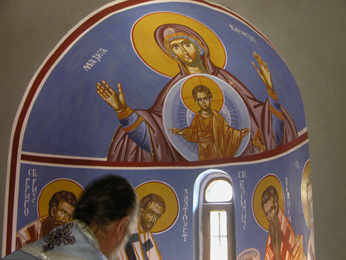
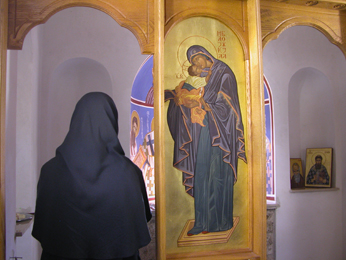
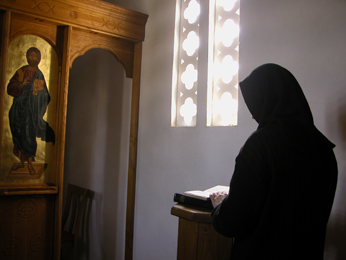
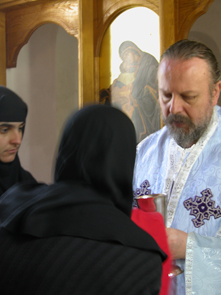
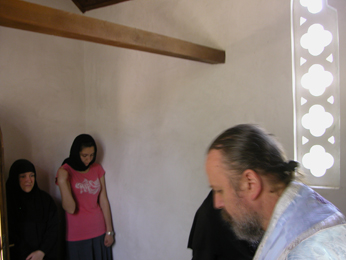
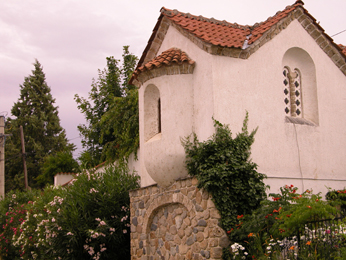
The Lord said, “Therefore whoever hears these sayings of Mine, and does them, I will liken him to a wise man who built his house on the rock: and the rain descended, the floods came, and the winds blew and beat on that house; and it did not fall, for it was founded on the rock.
But everyone who hears these sayings of Mine, and does not do them, will be like a foolish man who built his house on the sand: and the rain descended, the floods came, and the winds blew and beat on that house; and it fell. And great was its fall” (Matthew 7:24-27).
What do Christians usually and most often think when they read this part of the Gospel? Or, what do we all usually think? It is natural for us to think, when there is a rock mentioned on which a house is built, that it is a matter of something solid and safe. And we most often think that it refers to Christ, and His Body—the Church, on Whom we are founded. Then we think that true faith—the Orthodox might be in question, or maybe both the former and the latter. And that is it; our mind does not go any further. This thought is true as well, yet it is not the most precise.
The thing that we identify ourselves as Orthodox Christians still does not have to mean anything, either before the Lord or for the life and salvation of other people; for the stability of our spiritual life either. There are many only by form (formal) or by name (nominal) Christians whose life is not in line with Christ’s commandments. The Holy Fathers of the Church have set another criterion for something solid, safe, and consistent in spiritual life. That criterion is inner and at the beginning it is based on what Christ said: “Whoever hears these sayings of Mine, and does them.” The hearing and the doing are comprised in the word “obedience”. Obedience is a struggle to bring into line the mode of our life with the first stage of spiritual growth at which we are. Obedience is safety and stability, such that are based on the spiritual father and his guidance.
The real question is: at what stage of the spiritual development do we acquire the personal firmness, stability or consistence in spiritual life on which we can build up something safe and valuable (or, on which our fellowmen can build up something safe and valuable, particularly they who are under obedience to us)?
The Holy Fathers (for instance, elder Ephraim of Philotheou) say, “The mind is easily defiled, yet it is likewise easily purified. The heart is hard to purify, yet also hard to defile.” Thus, once opened and purified heart i.e. sufficiently purified essence of the mind is hard to defile later. So much and such defilement or closure of the heart can be caused only by a great sin. A sufficiently purified and open heart, prayer of the mind inside the heart, and illumined mind—these are the characteristics of the second level of spiritual development. At this level we acquire the personal firmness, stability or consistence in the spiritual life.
The stability and firmness of spiritual life can be tried, checked, seen, or clarified also through the type of the temptations that we experience. For, the floods and the winds that come are nothing but the physical and the spiritual temptations. There are various temptations at each of the stages.
At the first stage, while the heart is captive to the passions, the demon has direct access from within. It is sufficient that he drops a thought, instigates certain desire, awakens a passion from within in order to lead the man to a fall. At the second stage, when there is certain purification from the passions reached, sufficient for baptismal grace to manifest itself in the heart and for the mind to be attracted inside the heart, the demon does not have so much power as to cause a fall in the monastic from the inside, through the passions, and thus he has to assault from the outside. This means that the small part of insufficiently transformed passions has to be provoked by a great challenge. At the second stage, the demon has to procure a real challenge: instead of an indecent thought about a person of the opposite sex, he must procure the person’s real presence. He needs precisely a real challenge in order to try to cause a fall in the ascetic. At the third stage, which can be seen in the lives of the Saints, the demon appears personally as well; yet, about this some other time.
However, the Lord does not allow temptations greater than we can endure, is not that so? Also, are not the temptations dosed and allowed for our self-knowledge, purification, growth, and perfection, rather than for our fall? That is correct; still, there is another kind of temptations—beyond our strength. These are temptations that we personally create because we occupy positions, in the Church and generally in the society, which are not correspondent with our inner spiritual cover. These are temptations that happen to us because we do not bring into line the mode of our life and struggle with the level of our spiritual development.
Seizure and occupation of positions without the inner spiritual cover is groundless position or a construction liable to a fall at coming temptations. How great the temptations will be depends on the relation between the inner spiritual state and the position we occupy. The greater the position and at the same time the lesser the inner cover, the greater the temptations. I am not speaking about the kind of the temptation as much as about the power with which it strikes us inside. For instance: a man with the episcopal rank and with spiritual state of the first level can be thrust into a fall by ordinary thoughts. Here the mighty floods and the strong wind are the thoughts. Still, is there a greater fall than the self-obstruction of our spiritual development?
Let us conclude: the sound foundation, on which we can build up our spiritual life, for the first level of spiritual growth is the struggle for absolute wholehearted obedience, while for the second level that is the struggle in the ascetic mind-and-heart prayer and love toward the enemies. This is, not mine but, patristic teaching and Tradition, and we must be much careful because “whoever falls on this stone will be broken; but on whomever it falls, it will grind him to powder.” He falls on the stone and is broken who persecutes it, and the stone falls on him who teaches the people falsely and it grinds him to powder.
The Godman Christ calls us not to resemble a foolish man who built a house on the sand, but to be like a wise man who built a house on the rock, since we will certainly not escape the day when the firmness of our building will be examined.
Most Holy Theotokos save us!
Metropolitan Nahum of Strumica